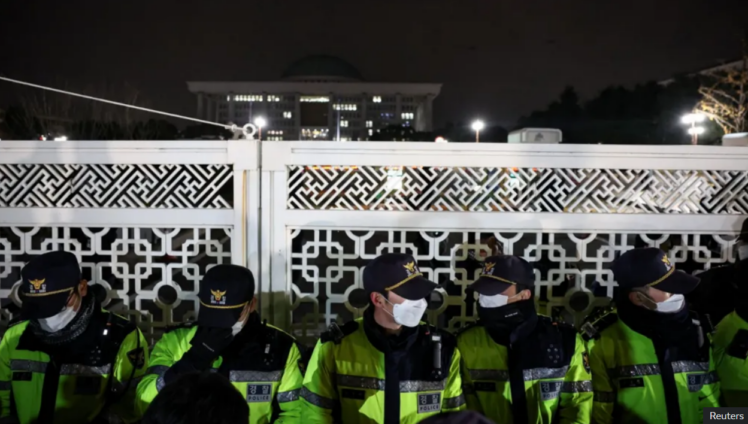
Audio By Carbonatix
In the face of political pressure, South Korea's President Yoon Suk-yeol has declared martial law in the democratic country for the first time in more than 50 years - prompting protests near the country's parliament building.
The late-night pronouncement - made on national TV at 23:00 local time (14:00 GMT) had citizens immediately thinking it was related to North Korea - the South's nuclear-armed neighbour- or a critical matter of national security like a terrorism event or coup.
However, it became clear fairly quickly that Yoon had made this drastic move in response to a series of political events.
Having lost control of parliament earlier in the year, his government had been battling a series of opposition bills and motions which had sought to undermine his rule.
Political observers say he's now been driven to the point of invoking martial law - temporary rule by the military - as an undemocratic tactic to fend off the political attacks.
What was the immediate response?
Opposition leaders on Tuesday immediately condemned the move as unconstitutional.
South Korea’s main opposition party leader Lee Jae-myung called on his Democratic Party MPs to converge on parliament on Tuesday night to vote down the declaration.
But in Seoul, police buses had already been moved in to block or barricade the entrance to the parliament building, local broadcasts showed.
Still, demonstrators have rushed to the National Assembly building, protesting and chanting "No martial law! No martial law". They have clashed with lines of police guarding the building.
How significant is martial law?
Martial law is temporary rule by military authorities in a time of emergency, when civil authorities are deemed unable to function.
The last time it was declared in South Korea was in 1979, when a long-term president had been assassinated during a coup.
It has never been invoked since South Korea became a parliamentary democracy in 1987.
But on Tuesday, Yoon pulled that trigger, in a national address saying he was invoking military rule over a threat from "anti-state forces".
Under martial law, extra powers are given to the military and there may be a suspension of usual rule of law protections and procedures.
What's the political context?
Yoon has been a lame duck president since South Korea's general election in April when the opposition won a landslide.
His government since then has not been able to pass bills they wanted and have been reduced instead to vetoing bills the opposition have been passing.
He has also seen a dive in his popularity with voters; having been mired in several political influence and corruption scandals - including one involving the First Lady accepting a Dior bag, and another around stock manipulation.
Just last month he was forced to issue an apology on national TV, saying he was setting up an office overseeing the First Lady's duties. But he rejected a wider or independent investigation, which opposition parties had been calling for.
Then this week, the opposition proposed slashing budgets for his government - and a budget bill cannot be vetoed.
At the same time, the opposition also moved to impeach cabinet members, including the head of the government's audit agency - for failing to investigate the First Lady.
What now?
Yoon's declaration caught many off guard - it's a fast-moving situation now.
The political opposition has called on the public to gather in protest outside parliament - peaceful mass demonstrations are common in South Korea and they have proven effective in changing governments before.
The main opposition Democratic Party on Tuesday night immediately called for all its lawmakers to assemble at the National Assembly.
Under South Korean law, the government must lift martial law if a majority in parliament - the National Assembly - demands it in a vote. The same law also prohibits martial law command from arresting lawmakers.
But police buses had already been moved into place in front of the building in what is being viewed as a barricade to stop lawmakers from reaching the assembly.
There is also discord within Yoon's own party, the People's Power Party leader.
Its leader Han Dong-hoon has called the declaration of martial law a "wrong" move, South Korean outlet Yonhap is reporting. He has vowed to block the law.
Latest Stories
-
Ghana is rising again – Mahama declares
2 hours -
Firefighters subdue blaze at Accra’s Tudu, officials warn of busy fire season ahead
3 hours -
New Year’s Luv FM Family Party in the park ends in grand style at Rattray park
3 hours -
Mahama targets digital schools, universal healthcare, and food self-sufficiency in 2026
3 hours -
Ghana’s global image boosted by our world-acclaimed reset agenda – Mahama
3 hours -
Full text: Mahama’s New Year message to the nation
3 hours -
The foundation is laid; now we accelerate and expand in 2026 – Mahama
4 hours -
There is no NPP, CPP nor NDC Ghana, only one Ghana – Mahama
4 hours -
Eduwatch praises education financing gains but warns delays, teacher gaps could derail reforms
4 hours -
Kusaal Wikimedians take local language online in 14-day digital campaign
5 hours -
Stop interfering in each other’s roles – Bole-Bamboi MP appeals to traditional rulers for peace
5 hours -
Playback: President Mahama addressed the nation in New Year message
5 hours -
Industrial and Commercial Workers’ Union call for strong work ethics, economic participation in 2026 new year message
7 hours -
Crossover Joy: Churches in Ghana welcome 2026 with fire and faith
7 hours -
Traffic chaos on Accra–Kumasi Highway leaves hundreds stranded as diversions gridlock
7 hours

